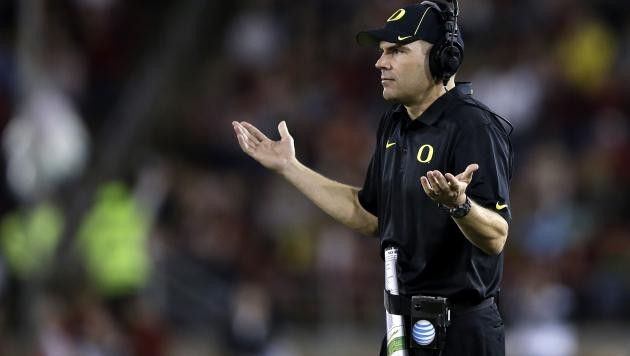Anyone who has read this spot for a few years (all 17 of you) knows that this isn’t a hotbed of columns about potential coaching changes. Many folks who write about college football are fairly cavalier about “hot seat” lists and the like, which is fine since people want to read it, but this spot has thought the oily layer of guys who lose their jobs because the top guy loses his job is usually overlooked.
And those are the guys who really have to pack up a family and grind to make it somewhere else, because a big contract isn’t going to hold them over for a few years since they don’t have it.
Which brings us to Oregon, coach Mark Helfrich, and the uncomfortable truth that it seems amazingly short-sighted to go all bulldozer to the program a whole year-and-a-half from playing for a CFB Playoff title. Unfortunately, even Rand Paul might authorize regime change in this case.
After the defense was utterly dismantled again, this time by Cal on Friday night to the tune of 52-49 in double overtime, the once powerful Ducks now sit at 2-5 with their season goals squashed and even a bowl opportunity twisting in the wind about to be taken up into the clouds.
It marks the third straight game the Ducks have given up over 50 points, obviously all in losses. They gave up a ghastly 70 to Washington, who now looks like what Oregon used to not so long ago.
You can look at this one of two ways:
1. The reality is, in this college football climate, no program is immune to the occasional terrible season and this is just that.
No matter how traditional the power, it’s tough anymore to sustain consistent success across multiple coaching changes without some painful years. Oregon’s success over the years running into this year just makes it the latest victim of a climate where it’s just too tough to be good for too long without a hiccup here and there.
2. Helfrich hasn’t been able to find a quarterback, the defense has gotten worse, and Chip Kelly’s recruits will soon be all gone, and so will Oregon’s success. Move on.
Duck Cameron Hunt two weeks ago noted that some guys on the team don’t care if they win, and that’s a major fly in the ointment. Guys not caring if they win or lose denotes a massive culture issue, one that typically doesn’t absolve itself over the course of a year.
College sports are unique in the sense that the stars sit alongside the folks that either cheer them on or boo them on Saturdays, and it’s impossible to get away from the feeling of an electric campus when you win, and a dour, possibly toxic one when you lose. It’s not the NFL, where bad losses can be explained away to the media before shoving off into a gated community that Batman couldn’t easily get to your house in.
If you think Hunt’s comments are just a one-year deal, then you probably think no change is needed. After all, Helfrich came into this season at 21-6 as a head coach. After all, the transition from Marcus Mariota was never going to be easy. And after all, Lord knows the Ducks have been ravaged by injuries.
All of that triggers to not shaking up the apple cart for the sake of one bad year, no matter how long it stings.
Oregon will have a tough choice to make, deciding whether or not this year is an aberration, or the continued inability to find success at a program that relies so heavily on it at the quarterback position is just a temporary blip or if it’s a systemic issue.
Helfrich twice has gone to the FCS transfer ranks to find one-year stop gaps at the position, one that Oregon’s offensive system relies so heavily on. You simply cannot run a hyper-fast offense with the quarterback isn’t getting the ball down the field consistently, because the defense goes back on the field so quickly, and eventually gets tired and the levy breaks.
Oregon’s system isn’t, and never has been made for 3 and outs. They’re just not set up to win games 13-7. It’s fine. It’s had success. But when it doesn’t, the result is ugly. This year has been all of that word … ugly.
Coaching changes so soon after such national success seems like the fodder only for clicks or easily outraged fans who don’t understand the difficulty in this stuff. The reality of the need is rare.
If Oregon doesn’t look like a cogent football team going forward, “rare” might be the only option in Eugene, unfortunately.

